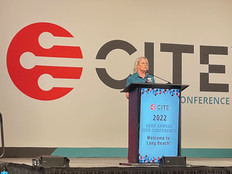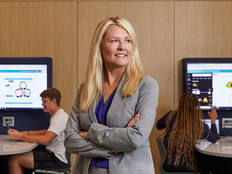Brain Booster: BrainWare Safari Is a Software Success
Neuroscience program improves cognitive skills and test scores at a Michigan school district.
When a great student from Harbor Beach Community Schools scored a 20 in the reading section of his ACT test, teachers knew he could do better. They were right: The next time the high school junior took the test, his score jumped to 30.
Educators attribute the improvement to his use of a neuroscience-based program from Learning Enhancement that develops cognitive skills such as logic, reasoning and problem solving. “This was a phenomenal jump, and the only thing he did different was BrainWare Safari,” says Curtis Boehmer, a speech pathologist for Harbor Beach schools in rural Michigan.
Boehmer came across BrainWare Safari when he was looking for ideas to help language-delayed students. Impressed by the manufacturer's claims about the software's effectiveness, the superintendent and principal agreed to test the program.
Harbor Beach K–12 teachers invited 10 struggling students to participate in a 10-week program working with the learning tool for 45 minutes a day, four days a week. After the study, the average improvement in “intellectual age” was three years, one month (plus or minus two years, one month). The greatest improvement was a student who initially tested at the intellectual age of 12 years, 5 months, who after the study tested at 20 years, 4 months.
Peter Kline, an education expert and author of Why America's Children Can't Think: Creating Independent Minds for the 21st Century, witnessed similar results after adult family members used BrainWare Safari. “It's a transformation nobody would believe,” he says. One nephew who had never been much of a reader got rid of his cable television service, and a college student stepson fell in love with textbooks.
Making Learning Fun
Set in a jungle, using a video-game format, BrainWare Safari “is delivered in a very entertaining manner,” says Harbor Beach's Boehmer. Animal characters start off as babies and mature as users progress through the program. “When their animals grew, they were very excited.”
The program becomes less fun at the point it becomes too difficult, Boehmer says, noting teachers must use some motivational incentives. For example, he treated three high schoolers to lunch off campus after they completed the entire program.
Dr. Patricia Wolfe, an expert in translating neuroscience findings for educators and author of Brain Matters: Translating Research Into Classroom Practice, agrees the program sometimes really challenges users. “I've seen 10-year-olds whip through a game that they previously could not do and with which even I had problems,” she says.
Wolfe notes that it's the first program she's endorsed, and she's seen a lot of them. “I just want kids to be successful, and I want them to have fun doing that. This program meets both of those needs.”
Kline recommends the use of BrainWare Safari and other cognitive programs. Harbor Beach Community Schools, for example, now uses it in conjunction with a reading program called EBLI (Evidence-Based Literacy Instruction). Boehmer says the district is purchasing more copies of BrainWare so all students from second grade through 12th will use the tool during their education.
Kline says BrainWare Safari and other neuroscience programs are “going to transform how we look at education.”
7 years, 11 months:
The amount of improvement in intellectual age measured in one student in Harbor Beach's BrainWare Safari pilot.







